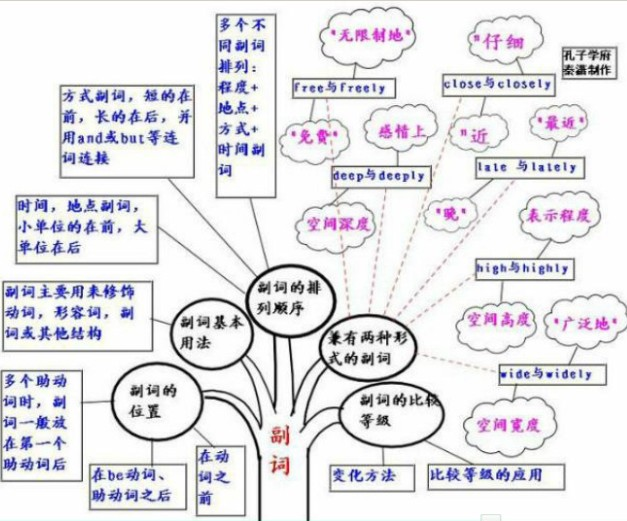本试题 “Do you think that bridge ________ 2,000 meters long? It doesn't appear ________ long.[ ]A. measures; thatB. is measured; soC. is measured; suchD. m...” 主要考查您对副词
一般现在时
等考点的理解。关于这些考点您可以点击下面的选项卡查看详细档案。
- 副词
- 一般现在时
副词的概念:
副词是指在句子中表示行为或状态特征的词,用来修饰动词、形容词、其他副词、介词短语、非谓语动词乃至整个句子,表示时间、地点、程度、方式等概念。
副词的位置:
1)在动词之前。
2)在be动词、助动词之后。
3)多个助动词时,副词一般放在第一个助动词后。
注意:
a. 大多数方式副词位于句尾,但宾语过长,副词可以提前,以使句子平衡。
如:We could see very clearly a strange light ahead of us.
b. 方式副词well,badly糟、坏,hard等只放在句尾。
如:He speaks English well.
副词的排列顺序:
1)时间,地点副词,小单位的在前,大单位在后。
2)方式副词,短的在前,长的在后,并用and或but等连词连接。
如:Please write slowly and carefully.
3)多个不同副词排列:程度+地点+方式+时间副词。
注意:副词very可以修饰形容词,但不能修饰动词。
改错:(错)I very like English.
(对)I like English very much.
注意:副词enough要放在形容词的后面,形容词enough放在名词前后都可。
如:I don't know him well enough.
There is enough food for everyone to eat.
There is food enough for everyone to eat.
兼有两种形式的副词:
1)close与closely:
close意思是“近”;closely意思是“仔细地”。
如: He is sitting close to me.
Watch him closely.
2)late与lately:
late意思是"晚";lately意思是“最近” 。
如:You have come too late.
What have you been doing lately?
3)deep与deeply:
deep意思是“深”,表示空间深度;deeply时常表示感情上的深度,“深深地” 。
如:He pushed the stick deep into the mud.
Even father was deeply moved by the film.
4)high与highly:
high表示空间高度;highly表示程度,相当于much。
如:The plane was flying high.
I think highly of your opinion.
5)wide与widely:
wide表示空间宽度;widely意思是“广泛地”,“在许多地方”。
如:He opened the door wide.
English is widely used in the world.
6)free与freely:
free的意思是“免费”;freely的意思是“无限制地”。
如:You can eat free in my restaurant whenever you like.
You may speak freely, say what you like.
副词知识体系:

一般现在时的概念:
表示通常性、规律性、习惯性的状态或者动作(有时间规律发生的事件)的一种时间状态。
一般现在时的用法:
1)经常性或习惯性的动作,常与表示频度的时间状语连用。常用的时间状语有every...,sometimes,at...,on Sunday等。
例如:I leave home for school at 7 every morning. 每天早上我七点离开家。
2)客观真理,客观存在,科学事实。
例如:The earth moves around the sun. 地球绕太阳转动。
Shang hai lies in the east of China. 上海位于中国东部。
3)表示格言或警句。
例如:Pride goes before a fall. 骄者必败。
注意:此用法如果出现在宾语从句中,即使主句是过去时,从句谓语也要用一般现在时。
例如:Columbus proved that the earth is round. 哥伦布证实了地球是圆的。
4)现在时刻的状态、能力、性格、个性。
例如:I don't want so much. 我不要那么多。
Ann writes good English but does not speak well. 安英语写得不错,讲的可不行。
比较:Now I put the sugar in the cup. 把糖放入杯子。
I am doing my homework now. 我正在做功课。
第一句用一般现在时,用于操作演示或指导说明的示范性动作,表示言行的瞬间动作。
第二句中的now是进行时的标志,表示正在进行的动作的客观状况,所以后句用一般现在时。
一般现在时知识体系:

一般现在时用法拓展:
1、一般现在时表将来:
1)下列动词come, go, arrive, leave, start, begin, return的一般现在时可以表示将来,主要用来表示在时间上已确定或安排好的事情。
例如:The train leaves at six tomorrow morning. 火车明天上午六点开。
—When does the bus star? 汽车什么时候开
—It stars in ten minutes. ?十分钟后。
2)以here, there 等开始的倒装句,表示动作正在进行。
例如:Here comes the bus.=The bus is coming. 车来了。
There goes the bell.=The bell is ringing. 铃响了。
3)在时间或条件句中。
例如:When Bill comes(不是will come), ask him to wait for me. 比尔来后,让他等我。
I'll write to you as soon as I arrive there. 我到了那里,就写信给你。
4)在动词hope, take care that, make sure that 等的宾语从句中。
例如:I hope they have a nice time next week. 我希望他们下星期玩得开心。
Make sure that the windows are closed before you leave the room. 离开房间前,务必把窗户关了。
2、一般现在时代替一般将来时:
When, while, before, fter, till, once, as soon as, so long as, by the time, if, in case(that), unless, even if, whether, the moment, the minute, the day, the year, immediately等引导的时间状语从句,条件句中,用一般现在时代替将来时。
例如:He is going to visit her aunt the day he arrives in Beijing. 他一到北京,就去看他姨妈。
3、一般现在时代替一般过去时:
1)"书上说","报纸上说"等。
例如:The news paper says that it's going to be cold tomorrow. 报纸上说明天会很冷的。
2)叙述往事,使其生动。
例如:Napoleon's army now advances and the great battle begins. 拿破仑的军队正在向前挺进,大战开始了
4、一般现在时代替现在完成时:
1)有些动词用一般现在时代替完成时,如hear, tell, learn, write, understand, forget, know, find, say, remember等。
例如:I hear(=haveheard)he will go to London. 我听说了他将去伦敦。
I forget(=have forgotten)how old he is. 我忘了他多大了。
2)用句型"It is…since…"代替"It has been…since…"。
例如:It is(=has been)five years since we last met. 从我们上次见面以来,五年过去了。
5、一般现在时代替现在进行时:
在Here comes…/There goes…等句型里,用一般现在时代替现在进行时。
例如:There goes the bell.铃响了。
时态一致:
1、如果从句所叙述的为真理或相对不变的事实,则用现在时。
例如:At that time, people did not know that the earth moves. 那时,人们不知道地球是动的。
He told me last week that he is eighteen.上星期他告诉我他十八岁了。
2、宾语从句中的,助动词ought, need, must, dare的时态是不变的。
例如:He thought that I need not tell you the truth. 他认为我不必告诉你真相。
与“Do you think that bridge ________ 2,000 meters long? It d...”考查相似的试题有:
- Many newspapers claim to be politically neutral, but few________ are.A.seriouslyB.actuallyC.immediatelyD.anxiously
- 短文改错 。假定英语课上老师要求同桌之间交换修改作文,请你修改你同桌写的以下作文。文中共有10处语言错误,每句中最多两处...
- 改错题.。I had never interested in sports,unlike most of myclassmates.After the school they would take part in either...
- In order to avoid something unpleasant, everyone present should stick to the agreement___________.A.traditionallyB....
- . Dr Smith, together with his wife and daughters, ________ visit Shanghai Expo this summer.A.is going toB.are going...
- — Were you surprised by the ending of the film?— No, I ______ the book, so I already knew the story.A.was readingB....
- 短文改错假如英语课上老师要求同学们交换修改作文,请你修改你同桌写的以下作文。文中有10处错误,要求你在错误的地方增加、...
- The number of foreign students attending Chinese universities rising steadily since1990.A.isB.areC.has beenD.have...
- During the past 120 years, the world three waves of global economic integration(联合).A.witnessedB.witnessesC.ha...
- Don’t miss the musical when it____next month because all the actors give world class performances.A.comesB.will co...